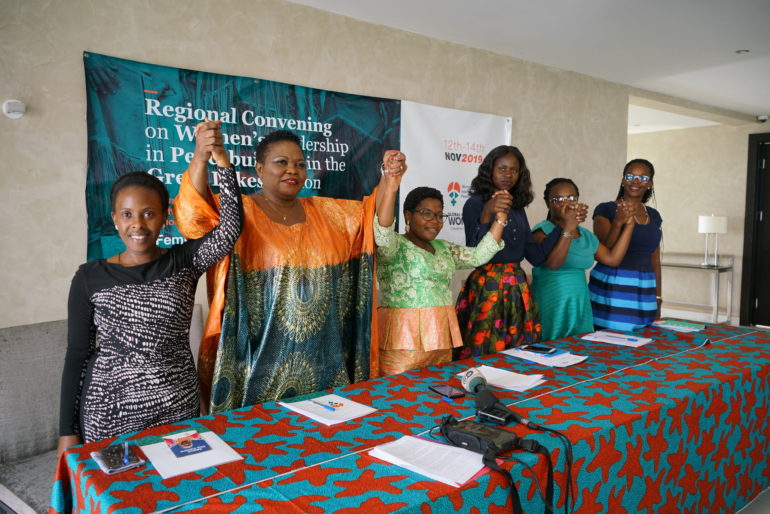International Peace Day – Actions for Women’s Peace: Prioritising Good Governance, Inclusivity and Non-violence
Women’s International Peace Centre joins the rest of the world in commemorating International Peace Day under this year’s theme, “Actions for Peace: Our Ambition for the #GlobalGoals.” The theme is a call to action that underscores our individual and collective roles in fostering a world where the Sustainable Development Goals (SDGs) are not just aspirations but realities—a world where the achievement of these goals paves the way for a culture of peace for all. We recognise that SDG16+[1] on peaceful, just and inclusive societies directly addresses the challenge of fragility and is a vital accelerator of Agenda 2030. However, progress on SDG16+ is poorer[2] than on almost any other SDG. Present global trends are discouraging as violence targeting civilians is becoming increasingly more common and deadly[3].
The Russia-Ukraine war has overshadowed all other conflicts, both in the sheer scale of violence and its deadliness, thus concealing a significant overall deterioration of the security situation in most other regions worldwide. The war, coupled with Russian military influence in Africa including the use of private military contractors like the Wagner Group in Mozambique and the Sahelian States of Mali, Burkina Faso, and Niger, has exacerbated conflicts in these regions, leading to increased instability on the continent. The proliferation of military bases, weapons and ammunitions as witnessed in Sudan has transformed[4] violent acts into more complex war-like scenarios.
In such conflicts, women often bear the brunt of violence and insecurity. For instance, as the war in Sudan rages on, gender-based violence (including conflict-related sexual violence) is a major concern, with an estimated 2.7 million women and girls at risk[5] due to the disruption of services and lawlessness as a result of the conflict. In Ethiopia’s Tigray region, 2,204[6] women and girls reported sexual violence to health facilities between November 2020 and June 2021. One of the one-stop centres reported that the victims in over 90% of cases were underage girls and estimated that visits to the centre had quadrupled since the conflict erupted in 2020.
Women in Africa continue to be relegated to the margins and their participation in peace negotiations is starkly hindered by the militarisation of peace processes. During the Luanda and Nairobi peace consultations on the situation in the Democratic Republic of Congo (DRC), women were significantly absent. Likewise, in the Chad peace talks in Doha in 2022, there was only one woman among the over 50 participants[7] present. In the current Sudan crisis, women have been significantly excluded from the formal ceasefire negotiations despite glaring evidence that they are effective in driving political transition and advocating for sustainable peace and stability.
The sobering reality in the DRC and South Sudan as the two countries prepare for elections serves as a stark testament to the persistent and deeply troubling trend of women’s ongoing exclusion from vital political processes. There are reports of rising violence against women, political leaders and activists in the DRC. Women also face barriers to vote, such as the lack of voter documentation required for registration and the general lack of information on electoral procedures, especially in the more isolated rural areas in North Kivu, Ituri and Mai-Ndombe which are currently under the control of armed groups. Women voters in rural and remote areas in South Sudan still lack access to credible information about the electoral process. Refugees and internally displaced women face challenges of restricted mobility and the lack of necessary identification documents to register and participate in the election process.
As the world celebrates this day of non-violence and cessation of hostilities, we re-echo the ideals envisioned by the United Nations Security Council Resolution 1325 on Women, Peace and Security. We emphasize that Actions for Women’s Peace include: advocating for women’s safe, meaningful and effective participation in peace processes as a fundamental component of sustainable peace; supporting efforts that prioritize non-violent conflict resolution and mediation, with a gender-sensitive approach that acknowledges the distinct experiences and needs of women in conflict zones; and standing against all forms of gender-based violence, including conflict-related sexual violence, which often escalates during conflicts, we therefore:
- Call for a shift towards promoting credible elections and good governance in Africa, including comprehensive electoral reforms, encompassing transparent voter registration and robust mechanisms to prevent electoral fraud which will strengthen the integrity of elections to increase public trust in democratic process. Strong institutions, the rule of law, and respect for human rights should also be promoted as fundamental components of good governance.
- Urge the prioritisation of inclusive and non-violent approaches to peacebuilding, with a central focus on dialogue as a means to achieve stable and sustainable ceasefires. These approaches should also aim to prevent the escalation of conflict and ensure the protection of civilians.
- Encourage governments to reduce military expenditures and redirect resources away from excessive military spending towards social services. This reallocation of resources should address the immediate needs of communities, rectify governance deficits, improve quality of life, and contribute to global stability.
[1] “SDG16+” refers here to the targets established under SDG16 as well as 36 targets from 7 other goals that directly measure an aspect of peace, justice or inclusion
[2] https://www.odi.org/sites/odi.org.uk/files/resource-documents/12424.pdf
[4]https://onpolicy.org/the-ukraine-russia-war-on-peace-and-security-challenges-in-africa/#:~:text=The%20Russia%2DUkraine%20war%20has,between%20Africa%20and%20the%20West.
[5] Sudan. 2022 HNO: IM Global GBV Country | Gender-Based Violence Area of Responsibility (gbvaor.net)
[6] Assessing the State of SRHR in Fragile and Conflict-Affected Countries in Africa
[7] 2022 Women and peace and security Report of the Secretary-General


